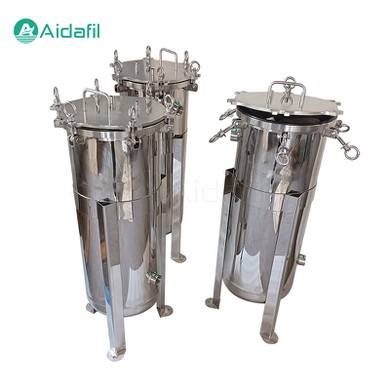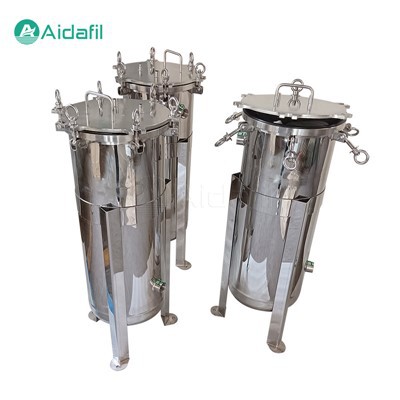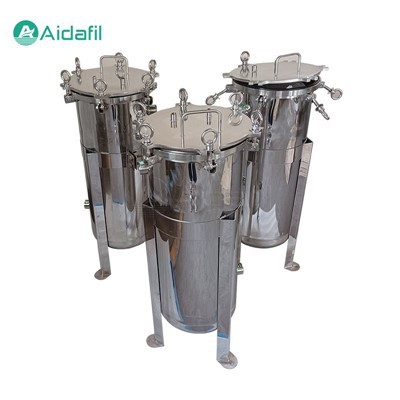
Good Quality Anti-Corruption Bag Filter
Our good quality anti-corruption bag filter is composed primarily of a filter housing, an upper cover, a quick-opening mechanism, and a support mesh basket. It can adapt to different filtering requirements. Its filter bags come in various sizes, materials, and pore sizes, allowing it to address specific impurities found in the liquids being filtered.

The good quality anti-corruption bag filter is designed to filter liquids by allowing them to flow into the equipment's inlet and out through its outlet after being filtered through a filter bag, while impurities are trapped in the bag and can be removed by simply replacing it during maintenance. This type of filter uses filter bags as its filtration element, which are supported by metal mesh baskets. It is suitable for precise filtering of liquids, removing even the smallest traces of impurities.
Design and Components
At its core, a good quality anti-corruption bag filter is a pressure-based filtration system that consists of several key components:
1. Filter Housing. The main body of the bag filter, typically constructed from sturdy materials like steel or plastic, designed to withstand the pressure of the fluid being filtered.
2. Upper Cover. This component sits on top of the housing and may include features such as inspection ports or handles for easy access.
3. Quick-Opening Mechanism. Often incorporated into the upper cover, this mechanism allows for rapid opening and closing of the housing for quick filter bag replacement or inspection.
4. Support Mesh Basket. A robust structure within the housing that supports the filter bags, ensuring they maintain their shape during operation and are not damaged by the pressure of the fluid passing through them.
5. Filter Bags. These are the heart of the bag filter system, made from a variety of materials such as polyester, nylon, or other synthetic fabrics, depending on the specific filtration requirements. They are designed to capture and retain contaminants while allowing the cleaned fluid to pass through.
Operational Principles
In operation, the fluid to be filtered enters the bag filter through an inlet port. As the fluid flows through the filter bags, the contaminants are trapped by the bag material, while the cleansed fluid continues through and exits via an outlet port. Over time, as the bags accumulate more and more particles, the pressure inside the housing may increase, indicating that cleaning or replacement of the bags is necessary.
Key Product Data
Precision : 0.5-1250 micron
Optional filter bags : PP/PE/NO
Amount of filter bags : 1-24
Recommended viscosity : 1-20000 cp
filter area : 0.1-24m2
Material of housing : 304, 316L, CMF
Working pressure : 0.6-1.0 Mpa
Advantages
The good quality anti-corruption bag filter offers several distinct advantages:
1. Simplicity and Ease of Maintenance. The modular design of bag filters makes them straightforward to maintain. When contaminants clog the filter bags, they can be quickly and easily replaced without the need for complex disassembly or specialized tools.
2. Cost-Effectiveness. Bag filters are generally more affordable than other types of filters, both in terms of initial purchase price and ongoing maintenance costs. The replaceable filter bags mean that the overall system can have a longer lifespan than disposable filters.
3. Versatility. With a wide range of filter bag materials and micron ratings available, bag filters can be tailored to meet specific filtration needs, from coarse pre-filtration to fine particle capture.
4. High Filtration Efficiency. Bag filters can achieve high levels of efficiency, capturing even very small particles, making them suitable for applications requiring precise fluid cleanliness.
5. Space-Saving Design. Due to their vertical orientation and compact nature, bag filters can be installed in tight spaces, making them ideal for retrofitting into existing systems or for use in areas where space is at a premium.
Applications
Bag filters find use in numerous applications, including:
- Wastewater Treatment. Removing suspended solids from water before it is discharged into the environment.
- Food and Beverage Production. Ensuring product purity by removing contaminants from liquids during processing.
- Chemical Processing. Cleaning chemical solutions by removing particulate matter that could affect product quality.
- Air Filtration. In industrial settings, capturing dust and other airborne particles to improve air quality and prevent equipment damage.
- Pharmaceutical Manufacturing. Ensuring the sterility of fluids used in drug production by removing microbial contaminants.
FAQ
1. Q: What is the function of a filter?
A: The main function of a filter is to remove solid particles, impurities, and harmful substances from liquids or gases, in order to achieve purification, clarification, and protection of equipment.
2. Q: How to choose a suitable filter?
A: When choosing a filter, factors such as the properties of the material being filtered (e.g., viscosity, temperature, corrosion), required filtration accuracy, processing capacity, operating pressure and medium, as well as the type, material, size, and installation method of the filter should be considered.
3. Q: What is the working principle of a filter?
A: The working principle of a filter mainly relies on physical screening, deep interception, absorption, or chemical reactions to remove impurities or harmful components from the material being filtered.
4. Q: How to maintain and care for a filter?
A: Maintenance of filters includes regular cleaning or replacement of filter elements, inspection of seals and fasteners, maintaining stable operating pressure, and avoiding overloading. Specific methods should be referenced from the filter's instruction manual and maintenance guides.
5. Q: What is the service life of a filter?
A: The service life of a filter depends on its working environment, processing volume, and filtration accuracy. Generally, when the filter's pressure drop reaches a certain value or the filtration effect decreases significantly, it needs to be replaced or cleaned.
6. Q: What should be paid attention to during filter installation?
A: During filter installation, attention should be paid to the directionality, ensuring that the fluid enters and exits from the correct ports. Also, the piping system should be cleaned before installation, and the filter should be securely fastened and sealed as required by the instructions.
7. Q: What is the replacement cycle for filters?
A: The replacement cycle for filters depends on their working conditions and filtration requirements, and is usually indicated by pressure difference indicators or timers. When the filter's pressure drop reaches the set value or the filtration effect decreases, it should be replaced in a timely manner.
Why Choose Us
· Professional manufacturer with many years' experience
· Good quality with competitive price
· OEM & ODM are welcome
· Various payment items are acceptable
· Good service by experienced manager
AIDA Philosophy
1. Management Concept:
· Satisfy the customers' demand --- Touch customers, trust with our products and services
· Make employees happy --- Pursue higher material and spiritual happiness
2. Company Mission:
· Focus on customer needs, provide best filtering solution
· To be the lifelong partner with customers
3. Corporate Vision:
· Become a global purification leadership brand
4. Values:
· Customer: Pursue the ultimate experience, enjoy excellent quality
· Team: Trust, responsibility, growth, win-win
· Work: Simple, sincere, efficient, dedicated
Hot Tags: good quality anti-corruption bag filter, China, factory, price, buy, long life span compressor oil separator, glass fiber compressor oil separator, lube oil filter elements for steel plant, 200 micron transformer oil filter cartridge, reliable hydraulic oil filter element, fully automatic backwash filter







